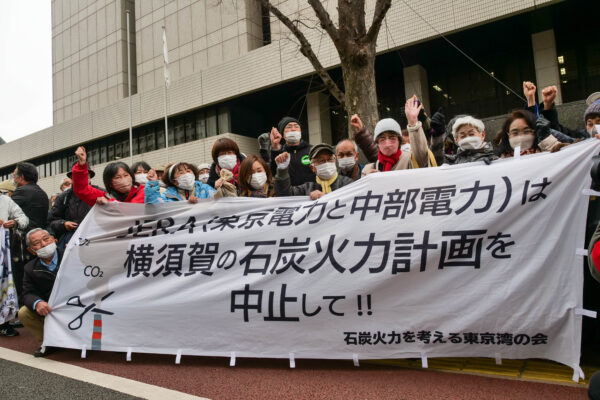On January 27, 2023, the Tokyo District Court issued a decision on the administrative case in which 48 citizens sued the Ministry of Economy, Trade and Industry (METI), requesting the revocation of the Notice of the Finalization for the submitted Statement of the Environmental Impact Assessment (EIA) of the Yokosuka coal-fired power plant.
Among the 48 plaintiffs, the claims of citizens residing in five cities and towns on the Miura Peninsula (Yokosuka City, Miura City, Zushi City, Kamakura City, and Hayama Town) were dismissed, and the court denied the claims of plaintiffs residing in Yokohama City and Chiba Prefecture without accepting the plaintiffs’ standing to sue. The plaintiffs and their lawyers intend to appeal this decision, claiming the court decision is unacceptable and unjust.
In this administrative case, local residents sued the government, which issued a final notice in the EIA at the planning stage of the construction of the Yokosuka coal-fired power plant (two units of 650 MW each). In the EIA, the project operator (JERA) considered the project an “improved replacement” of the old units, and simplified the procedures by following the government’s “Guideline for Streamlining EIA Procedures for Power Plant Replacements”. However, the environmental impact of greenhouse gas emissions was not selected as a consideration in the project’s planning stage consideration sheet, and the necessary assessments of air pollution and thermal effluent (rise in the area’s water temperature) were not conducted.
In response to the court’s dismissal of the case, the lawyers representing the plaintiffs issued a statement in Japanese outlining the following problematic points:
- Although the court acknowledged the specific threat of global warming damage and affirmed the standing of plaintiffs who live or work within 20 km of the Yokosuka coal-fired power plant and suffer air pollution damage from toxic substances, it denied the standing of plaintiffs with regard to global warming damage on the grounds that the Environmental Impact Assessment Act and Electricity Business Act do not protect the interests of those who suffer global warming damage.
- Because the conditions of Guideline for Streamlining EIA Procedures for Power Plant Replacements were met, the court ruled that there is no deficiency in the investigation and prediction of air pollution damage from hazardous substances, or damage caused by thermal effluent (wastewater), and that no investigation of PM2.5 is required.
- The court justified the finalized notice based on the “Director-General’s Summary” (2013), which states that environmental assessment of global warming does not require comparative studies with fuel types other than coal, and that the study and that the assessment is consistent with the national mid-term goals.
In 2015, when the Yokosuka coal-fired power plant was planned, was the same year that the Paris Agreement was signed and an international agreement was reached to limit global warming to “well below 2°C” and to “pursue efforts” to limit it to 1.5°C above pre-industrial levels. This plan, which will emit 7.26 million tons of CO2 every year if put into operation, is being implemented at a time when the world is greatly accelerating its efforts to tackle climate change. Nevertheless, the Japanese courts have never addressed the injustice of this plan and the government’s response.
In climate lawsuits all around the world, court rulings are coming down one after another ruling that governments and companies (fossil fuel businesses and others) must face up to the damage caused by climate change and establish more specific and stricter reduction targets and reduction plans. The latest ruling in Japan by the Tokyo District Court is unjust and highlights that the Japanese judiciary is out of step with the global trends regarding climate litigation.
Related site: Yokosuka Climate Case (written in Japanese) (Link)

